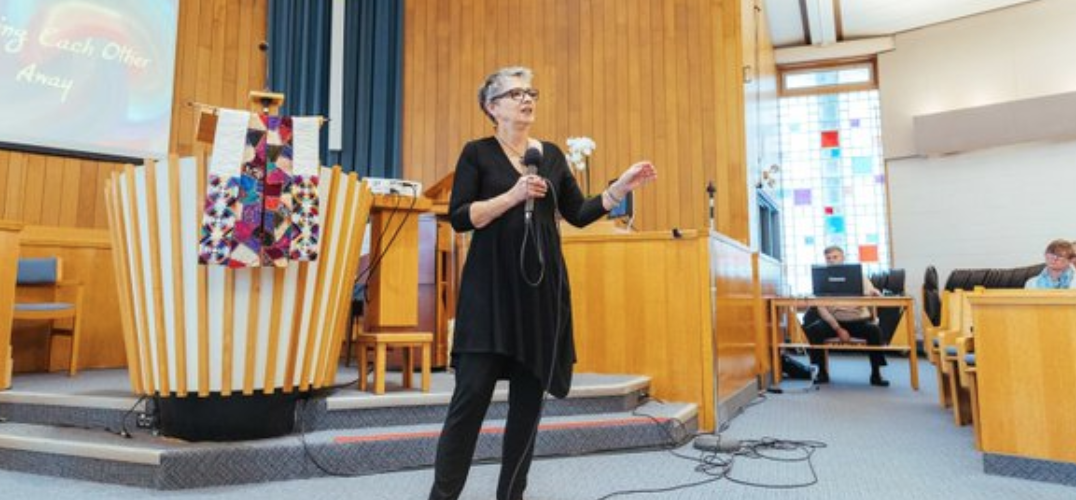Really interesting story: A Canadian Preacher Who Doesn’t Believe in Godhttps://t.co/tWxWzARaPI
— Carol Blymire (@CarolBlymire) February 5, 2019
The Rev. Gretta Vosper, the United Church of Canada pastor who doesn’t believe in God, has been the subject of a number of past GetReligion posts.
Just a few months ago, our own Richard Ostling offered a nice primer on Vosper and the progressive Christian denomination to which she belongs.
This past weekend, the New York Times featured a profile of Vosper.
The anecdotal opening of the Times’ story:
TORONTO — The Rev. Gretta Vosper hadn’t noticed the giant industrial metal cross rising in front of her church for years, hidden as it was by a bushy tree. But then someone complained about it.
Since Ms. Vosper does not believe Jesus was the son of God, the complainer wrote in an email, she should take the cross down.
“The next day, a storm took the tree out,” she said, peering up at the cross with a benign smile.
Some Christians might call that an act of God. But Ms. Vosper does not believe in God either. Instead, the parable says more about her determination. Despite being an outspoken atheist, Ms. Vosper has steadfastly maintained her place in the United Church of Canada, which with two million followers across the country is Canada’s pre-eminent Protestant church.
“This is my church,” said Ms. Vosper, 60. “The United Church made me who I am.”
Keep going, and this is an enjoyable piece to read — both in terms of Canada bureau chief Catherine Porter’s writing ability and the journalistic fairness shown to supporters and critics of the pastor who doesn’t believe in God.
Some more crucial material from the profile:
In a country where thinning congregations have led to many church sanctuaries being converted into condominiums, Ms. Vosper’s outspoken views have stirred an existential passion. She has made headlines and received death threats, one taped to the church’s front door that said, “Suffer the witch not to live.”
The thrice-married reverend has also driven a deep rift into a progressive church considered as Canadian as maple syrup. In 2015, a public letter she wrote sparked so much ire, the local jurisdiction of the church launched a review committee to examine her beliefs.
After a much-publicized hearing, which she called a “heresy trial,” the local panel ruled her “unsuitable” for ministry since she “does not believe in God, Jesus Christ or the Holy Spirit.” She was on the verge of being defrocked. But, just as the national church’s final review of her case began last November, the local jurisdiction settled with Ms. Vosper and agreed she could continue to minister her congregation in Toronto’s gritty east end.
“This doesn’t alter in any way the belief of The United Church of Canada in God,” the church announced, to the confusion of many. Since the terms of the settlement are confidential, congregants were left to divine for themselves what these two seemingly contradictory positions meant.
“To the confusion of many.” Give the Times credit for stating that simple fact as precisely as possible.
I’ll resist the temptation to copy and paste the entire story. I’ll simply note that the Times quotes two former leaders of Vosper’s congregation who provide colorful quotes on the notion of a pastor who doesn’t believe in God. My favorite is the comparison of Vosper to an Amazon manager who doesn’t believe in online shopping.
On the flip side, it’s imperative that a story such as this give readers some insight into exactly what a pastor who doesn’t believe in God preaches about.
The Times does that, as illustrated in this relevant section:
Since then, Ms. Vosper has slowly stripped away the traditional biblical language from her Sunday “weekly gatherings.” In its place, she put words and rituals that reflected her congregation’s agreed beliefs — love, justice, compassion, integrity, forgiveness.
To sit through a service at West Hill United is to feel like you’re watching an old classic film that has been dubbed into a different language.
Instead of the Lord’s Prayer, the congregation recites the “Words of Commitment,” which Ms. Vosper wrote with her third husband, the church’s musical director, Scott Kearns. They stand to sing humanist hymns dedicated to peace and love that the two also wrote.
Ms. Vosper gave up her robe and ordination stole, which she had lovingly stitched herself, using swaths from her life including part of her childhood living room curtains. She dresses like any other member of the congregation and preaches while walking the aisles between them.
This is a nice, informative profile that — better than most of the pieces we’ve analyzed before on Vosper’s case — clearly and compellingly sheds lights on this intriguing story north of the U.S. border.










